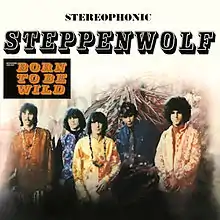Steppenwolf (Steppenwolf album)
Steppenwolf is the debut album by Canadian-American rock band Steppenwolf, released in January 1968 on ABC Dunhill Records.
| Steppenwolf | ||||
|---|---|---|---|---|
 | ||||
| Studio album by | ||||
| Released | January 29, 1968 | |||
| Recorded | Fall 1967 | |||
| Studio |
| |||
| Genre | ||||
| Length | 46:10 | |||
| Label | ABC Dunhill | |||
| Producer | Gabriel Mekler | |||
| Steppenwolf chronology | ||||
| ||||
| Singles from Steppenwolf | ||||
| ||||
| Review scores | |
|---|---|
| Source | Rating |
| AllMusic | |
| Rolling Stone | (positive)[2] |
| Sputnikmusic | |
| The Daily Vault | B+[4] |
The album was a successful debut for the band, featuring the songs "Born to Be Wild", as well as "The Pusher", both of which were used in the 1969 film Easy Rider. "Berry Rides Again" is a tribute to guitarist Chuck Berry. The spelling of track #4 on the vinyl is "Hootchie Kootchie Man". The album credits say it was recorded at American Recording Company in Studio City, California; however, the actual name of the studio was American Recorders.
The background color of the original ABC LP cover was a silver "foil", in contrast to later (MCA Records) LP issues and the modern CD sleeve in which it is replaced by off white. It is the only album by the band to have been released in both stereo and mono configurations. Although the latter is simply a 'fold down' of the stereo mix, it is sought after as a collector's item.
Early editions of the "silver foil background" version credit "Mars Bonfire" with writing "Born to be Wild" on both the LP label and the back of the LP cover.
Following the success of "Born to Be Wild", later releases had a black box on the cover with the wording: "Including The Hit: Born to Be Wild". The earliest 1968 versions of the album did not have this.
Track listing
| No. | Title | Writer(s) | Length |
|---|---|---|---|
| 1. | "Sookie Sookie" | Don Covay, Steve Cropper | 3:12 |
| 2. | "Everybody's Next One" | John Kay, Gabriel Mekler | 2:53 |
| 3. | "Berry Rides Again" | Kay | 2:45 |
| 4. | "Hootchie Cootchie Man" | Willie Dixon | 5:07 |
| 5. | "Born to Be Wild" | Mars Bonfire | 3:28 |
| 6. | "Your Wall's Too High" | Kay | 5:40 |
| No. | Title | Writer(s) | Length |
|---|---|---|---|
| 7. | "Desperation" | Kay | 5:45 |
| 8. | "The Pusher" | Hoyt Axton | 5:43 |
| 9. | "A Girl I Knew" | Kay, Morgan Cavett | 2:39 |
| 10. | "Take What You Need" | Kay, Mekler | 3:28 |
| 11. | "The Ostrich" | Kay | 5:43 |
| Total length: | 46:10 | ||
Personnel
Steppenwolf
- John Kay – lead vocals, guitars, harmonica
- Michael Monarch – guitars, backing vocals
- Goldy McJohn – Hammond organ, piano, Wurlitzer electric piano
- Rushton Moreve – bass guitar, backing vocals
- Jerry Edmonton – drums, backing vocals, percussion
Technical
- Gabriel Mekler – producer
- Bill Cooper – engineer
- Richard Podolor – engineer
- Gary Burden – art direction, cover design
- Tom Gundelfinger – photography
- Henry Diltz – photography
Charts
Album - Billboard (United States)
| Year | Chart | Position |
|---|---|---|
| 1968 | Billboard 200 | 6[5] |
Singles - Billboard (United States)
| Year | Single | Chart | Position |
|---|---|---|---|
| 1968 | "Born to Be Wild" | Billboard Hot 100 | 2[6] |
References
- Eder, Bruce. "Allmusic review". Allmusic.com. Retrieved 2012-09-13.
- "Steppenwolf: Steppenwolf : Music Reviews : Rolling Stone". 27 April 1968. Retrieved 13 September 2012.
- g, manos (April 2, 2014). "Review: CD Steppenwolf - Steppenwolf Album". Sputnikmusic. Retrieved 2014-04-07.
- Thelen, Christopher (2019). "The Daily Vault Music Reviews : Steppenwolf". dailyvault.com. Retrieved 5 February 2019.
- "Billboard 200 - Steppenwolf". Retrieved August 28, 2017.
- "Billboard Hot 100 - Steppenwolf". Retrieved August 28, 2017.
